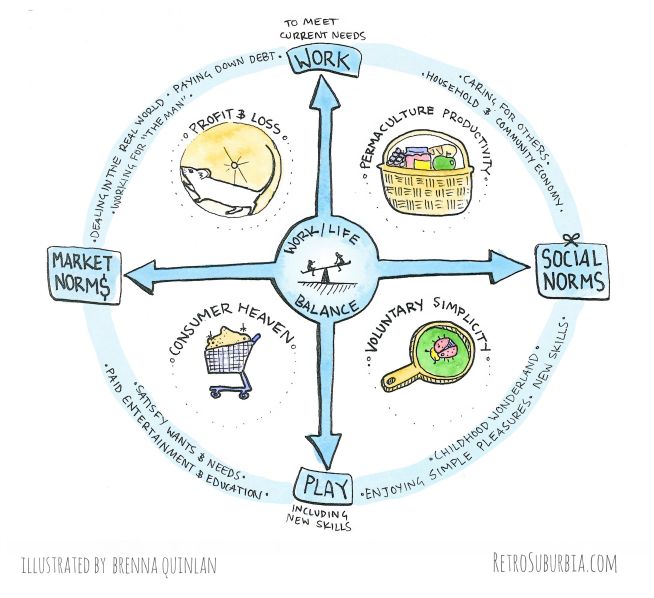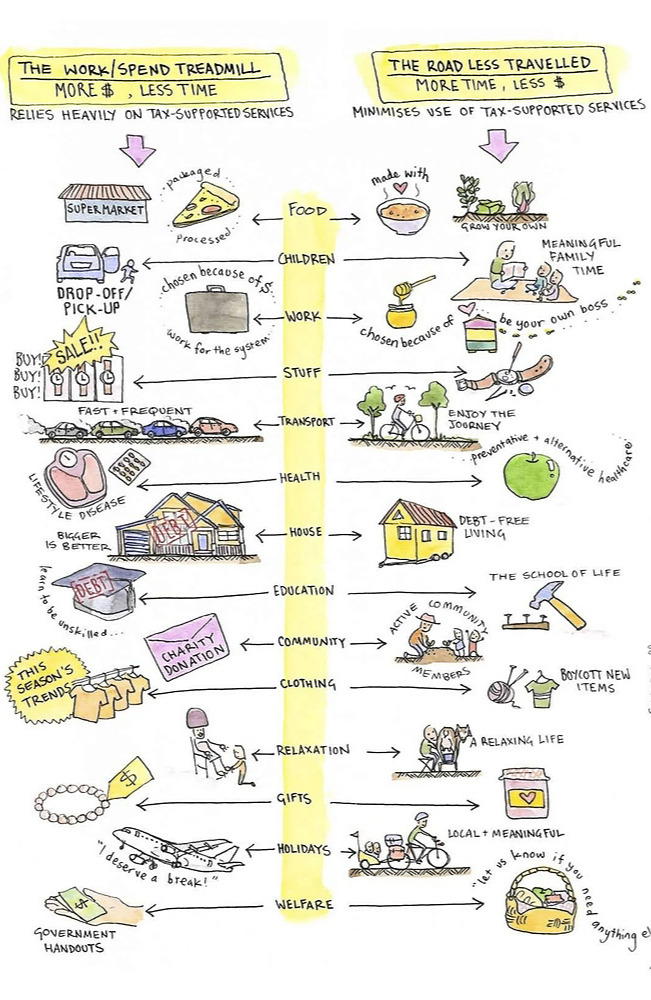Practical Permaculture Living - 2 Saturdays
Event description
In this two-day short course, you'll learn how to create a more abundant, easeful and resilient lifestyle in the suburbs!
Based on Permaculture Ethics and Principles, and drawing from the Retrosuburbia concept and other ecological living approaches, this empowering course will help you make the transition to regenerative living. You will learn how to:
- Design food growing systems for your property.
- Affordably retrofit your house to be more comfortable and energy efficient.
- Use fossil-fuel-free cooking and other appropriate technologies.
- Set up grey-water (laundry and kitchen waste water) irrigation systems for the garden.
- Significantly decrease your energy use (without compromising access or comfort).
- Get involved in the community and home non-monetary economy.
- Understand the permaculture functional design approach to getting unstuck!
Hands on learning with full support
Held at our 30-year-old demonstration permaculture site we'll get hands-on throughout the two days, and you'll get to practice various techniques. The course is structured to provide plenty of opportunities to ask questions and dive deeply into topics that interest you. With online material, and mid-week and post course check-ins you'll be fully supported on the journey to a practical permaculture-based lifestyle.
The course is facilitated by practitioners with decades of experience who walk-the-talk and use the permaculture approach throughout their lives.
What does the course look like?
On day one one we'll dive into the permaculture ethics, principles and the site design framework, which you'll then start applying to a real life suburban case study. You'll get to use the work-life balance matrix, a great tool for understanding we're we are at and where we want to be.

We'll then look at water - how it moves through the landscape, it's storage and use in the home and garden, including grey-water and natural pool systems.
On day two we will look at different options for growing food at home, from laid-back and intuitive to intense and scientific. Then will do a deep dive into designing an integrated food growing system, connecting elements according to function within the patterns of landscape, climate, and people flows. Energy use in the home is up next including hacks for climate control, and solar and rocket stove cooking demonstrations. And finally we'll examine how you can be a part of building a resilient community.
We'll be doing group work throughout the course to apply your new knowledge to a real-life suburban case study.
What is Permaculture?
Famously described as a 'revolution disguised as organic gardening', Permaculture is a proven design system for creating sustainable and regenerative ways of living. Some say it's a way of learning how to thrive without the stress and strive, by observing then tapping into nature's patterns of abundance. We live in an increasingly challenged and, for many, stress-filled world. The cost of living is increasing apace, social unrest is on the rise and the environment is in crisis. Permaculture offers a framework for addressing these challenges.
Course Duration and Timing
This short course runs across two Saturdays from 9am - 4pm each day. The dates are Saturday the 19th and 26th of October. Teenagers (12- to 18-year-olds) may also attended provided that they are accompanied by mum, dad or another adult guardian who has also paid to attend the course.

About the facilitators
Jenny is a permaculture designer, consultant and educator. A keen gardener since childhood, Jenny has a passion for creating resilient edible ecosystems that provide nutrient dense food while nourishing the earth and other beings. Through her practice, Living Patterns Permaculture, Jenny has worked with schools, community groups and home gardeners seeking to develop their own knowledge of edible ecosystems as a sustainable lifestyle. Jenny is dedicated to building resilient communities and food security in a sustainable and ethical way and has been involved with many local community food initiatives. She also holds a Bachelor of Applied Science majoring in Biology.
Gav helped set up Northey Street City Farm in the 1990's and he is currently the Farm's adult education coordinator and permaculture lead teacher. Gav created 'Eco-flat Brisbane', a showcase of permaculture apartment style living. He is the author of 'Community Food Futures in Australia' (2023) based on a Churchill Fellowship he received in 2020 and is also the Queensland Coordinator of Community Gardens Australia. Gav is an experienced gardener and consults widely in the community food space. Gav learnt permaculture with the co-originator, Bill Mollison, in 1997 and has done advanced courses with David Holmgren and Robin Clayfield, as well as studying Edible Forest Gardening with Martin Crawford at the UK Agroforestry Research Trust. He holds bachelor's degrees in Construction Engineering and Landscape Architecture, and a Certificate (Level 4) in Training and Assessment.
Tickets for good, not greed Humanitix dedicates 100% of profits from booking fees to charity


